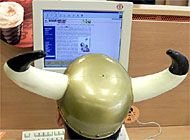Association grapples with sports information in Internet age

The International Association of Sports Information (IASI) is using its four-yearly congress in Lausanne to tackle the challenge of managing the increasing vast pool of information about sport in the Internet age.
Sport has spawned a whole new world of information and research which touches on many other fields of human activity – commerce, law, medicine and psychology, for example.
Sport has also been one of the key forces driving the growth of the worldwide web. It is said that a search for the word “sport” on the Internet will produce 120,000 replies. IASI sees itself as the ideal organisation to coordinate and make accessible this ocean of information.
Founded in 1960, IASI brings together a global network of sports scientists, information experts and managers of sports libraries and documentation centres.
In 1994, IASI was recognised by the Lausanne-based International Olympic committee (IOC), and the two organisations work increasingly closely together. This congress is being jointly hosted by the Olympic Museum and the University of Lausanne.
IASI deals with sports information in all its forms – from academic research to newspaper articles and even audiovisual information. But since its last congress in 1997, the world of information has changed considerably, thanks to the rise in popularity of the Internet.
“There’s been a real explosion in the volume of information,” says IASI’s outgoing president, Nerida Clarke. “And that information is more and more accessible, thanks to the Internet.”
Clarke, head of Australia’s National Sport Information Centre, says one of the key aims of the congress is to devise strategies to manage this diversity of information.
“We need to be able to guide those people who need the information to the right sources, and to do that quickly,” she told swissinfo, pointing out that IASI’s main role is as an intermediary, which can put athletes, academics, sports administrators, journalists and teachers in contact with the right people.
It might be a question of putting university researchers in touch with fellow academics in other parts of the world, providing physical education instructors in remote areas with the rules of a particular game, or helping athletes to view videos of past performances.
Clarke rejects suggestions that IASI might become irrelevant, given the fact that you can find almost anything on the web: “I see the Internet as a challenge, not a threat. The huge volume of information is the very reason for us to exist. People need help in finding the best and most trusted sources,” she says.
“We have no choice but to be carried on this wave of information. The aim is not to drown,” says Alain Poncet, of the French National Institute for Sports and Physical Education, who will take over from Clarke at the end of the congress.
“There will always be a need for reliable information,” Poncet adds.
IASI is trying to tackle some specific problems that have arisen as a result of the Internet. Sports fans may now enjoy real-time access to results and news, but this information is frequently discarded. The association is trying to put in place guidelines so that this useful data on the Internet – but also television and printed information – is archived, and not regarded as disposable.
IASI has some 190 members in 74 countries. These include government sports bodies, universities and private organisations. The Swiss-based members are the Macolin Federal Sports School and the Olympic Studies Centre Library, which is linked to the Olympic Museum.
There is an enormous disparity in the technological development in the various member countries, and the association is mindful that those in the South should not be left behind. Indeed, another important theme of the meeting in Lausanne is “equity of access”.
“We have to look at different models of information delivery. The Sports Institute in the Ivory Coast only has one telephone line, so the idea of using the Internet is out of the question. The information has to be tailored to different needs,” Clarke explains.
by Roy Probert

In compliance with the JTI standards
More: SWI swissinfo.ch certified by the Journalism Trust Initiative
You can find an overview of ongoing debates with our journalists here . Please join us!
If you want to start a conversation about a topic raised in this article or want to report factual errors, email us at english@swissinfo.ch.